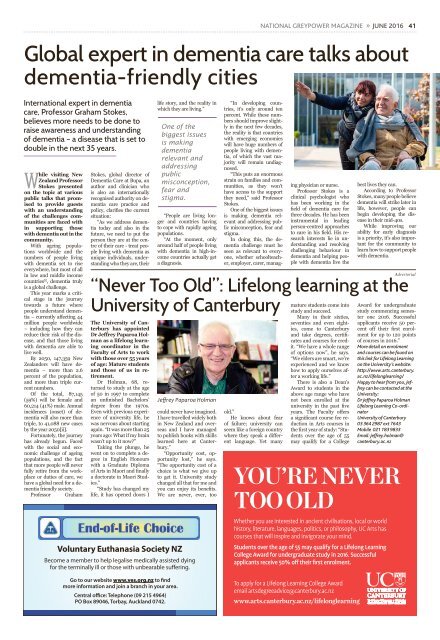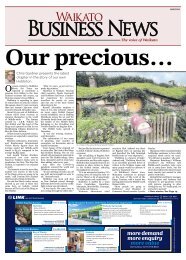Grey Power June 2016
The Grey Power Magazine is a prime national news source for its readers – New Zealand men and women over 50. Circulated quarterly to more than 68,000 members, Grey Power Magazine reports on the policies of the Grey Power Federation, and the concerns of the elderly, backgrounding and interpreting official decisions which affect their lives.
The Grey Power Magazine is a prime national news source for its readers – New Zealand men and women over 50. Circulated quarterly to more than 68,000 members, Grey Power Magazine reports on the policies of the Grey Power Federation, and the concerns of the elderly, backgrounding and interpreting official decisions which affect their lives.
You also want an ePaper? Increase the reach of your titles
YUMPU automatically turns print PDFs into web optimized ePapers that Google loves.
national <strong>Grey</strong>power mAGAZINE » june <strong>2016</strong> 41<br />
Global expert in dementia care talks about<br />
dementia-friendly cities<br />
International expert in dementia<br />
care, Professor Graham Stokes,<br />
believes more needs to be done to<br />
raise awareness and understanding<br />
of dementia – a disease that is set to<br />
double in the next 35 years.<br />
While visiting New<br />
Zealand Professor<br />
Stokes presented<br />
on the topic at various<br />
public talks that promised<br />
to provide guests<br />
with an understanding<br />
of the challenges communities<br />
are faced with<br />
in supporting those<br />
with dementia out in the<br />
community.<br />
With ageing populations<br />
worldwide and the<br />
numbers of people living<br />
with dementia set to rise<br />
everywhere, but most of all<br />
in low and middle income<br />
countries [i] , dementia truly<br />
is a global challenge.<br />
This year marks a critical<br />
stage in the journey<br />
towards a future where<br />
people understand dementia<br />
– currently affecting 44<br />
million people worldwide<br />
– including how they can<br />
reduce their risk of the disease,<br />
and that those living<br />
with dementia are able to<br />
live well.<br />
By 2050, 147,359 New<br />
Zealanders will have dementia<br />
– more than 2.6<br />
percent of the population,<br />
and more than triple current<br />
numbers.<br />
Of the total, 87,145<br />
(59%) will be female and<br />
60,214 (41%) male. Annual<br />
incidences (onset) of dementia<br />
will also more than<br />
triple, to 41,088 new cases<br />
by the year 2050[ii].<br />
Fortunately, the journey<br />
has already begun. Faced<br />
with the social and economic<br />
challenge of ageing<br />
populations, and the fact<br />
that more people will never<br />
fully retire from the workplace<br />
or duties of care, we<br />
have a global need for a dementia<br />
friendly society.<br />
Professor Graham<br />
Stokes, global director of<br />
Dementia Care at Bupa, an<br />
author and clinician who<br />
is also an internationally<br />
recognised authority on dementia<br />
care practice and<br />
policy, clarifies the current<br />
situation:<br />
“As we address dementia<br />
today and also in the<br />
future, we need to put the<br />
person they are at the centre<br />
of their care - treat people<br />
living with dementia as<br />
unique individuals, understanding<br />
who they are, their<br />
“Never Too Old”: Lifelong learning at the<br />
University of Canterbury<br />
The University of Canterbury<br />
has appointed<br />
Dr Jeffrey Paparoa Holman<br />
as a lifelong learning<br />
coordinator in the<br />
Faculty of Arts to work<br />
with those over 55 years<br />
of age: Mature students<br />
and those of us in retirement.<br />
Dr Holman, 68, returned<br />
to study at the age<br />
of 50 in 1997 to complete<br />
an unfinished Bachelors’<br />
degree from the 1970s.<br />
Even with previous experience<br />
of university life, he<br />
was nervous about starting<br />
again. “It was more than 25<br />
years ago: What if my brain<br />
wasn’t up to it now?”<br />
Taking the plunge, he<br />
went on to complete a degree<br />
in English Honours<br />
with a Graduate Diploma<br />
of Arts in Maori and finally<br />
a doctorate in Maori Studies.”<br />
“Study has changed my<br />
life, it has opened doors I<br />
life story, and the reality in<br />
which they are living.”<br />
One of the<br />
biggest issues<br />
is making<br />
dementia<br />
relevant and<br />
addressing<br />
public<br />
misconception,<br />
fear and<br />
stigma.<br />
“People are living longer<br />
and countries having<br />
to cope with rapidly ageing<br />
populations.<br />
“At the moment, only<br />
around half of people living<br />
with dementia in high-income<br />
countries actually get<br />
a diagnosis.<br />
Jeffrey Paparoa Holman<br />
could never have imagined.<br />
I have travelled widely both<br />
in New Zealand and overseas<br />
and I have managed<br />
to publish books with skills<br />
learned here at Canterbury.”<br />
“Opportunity cost, opportunity<br />
lost,” he says.<br />
“The opportunity cost of a<br />
choice is what we give up<br />
to get it. University study<br />
changed all that for me and<br />
you can enjoy its benefits.<br />
We are never, ever, too<br />
old.”<br />
He knows about fear<br />
of failure; university can<br />
seem like a foreign country<br />
where they speak a different<br />
language. Yet many<br />
“In developing countries,<br />
it’s only around ten<br />
percent. While these numbers<br />
should improve slightly<br />
in the next few decades,<br />
the reality is that countries<br />
with emerging economies<br />
will have huge numbers of<br />
people living with dementia,<br />
of which the vast majority<br />
will remain undiagnosed.<br />
“This puts an enormous<br />
strain on families and communities,<br />
as they won’t<br />
have access to the support<br />
they need,” said Professor<br />
Stokes.<br />
One of the biggest issues<br />
is making dementia relevant<br />
and addressing public<br />
misconception, fear and<br />
stigma.<br />
In doing this, the dementia<br />
challenge must be<br />
seen as relevant to everyone,<br />
whether schoolteacher,<br />
employer, carer, managing<br />
physician or nurse.<br />
Professor Stokes is a<br />
clinical psychologist who<br />
has been working in the<br />
field of dementia care for<br />
three decades. He has been<br />
instrumental in leading<br />
person-centred approaches<br />
to care in his field. His research<br />
interests lie in understanding<br />
and resolving<br />
challenging behaviour in<br />
dementia and helping people<br />
with dementia live the<br />
mature students come into<br />
study and succeed.<br />
Many in their sixties,<br />
seventies and even eighties,<br />
come to Canterbury<br />
and take degrees, certificates<br />
and courses for credit.<br />
“We have a whole range<br />
of options now”, he says.<br />
“We elders are smart, we’re<br />
experienced and we know<br />
how to apply ourselves after<br />
a working life.”<br />
There is also a Dean’s<br />
Award to students in the<br />
above age range who have<br />
not been enrolled at the<br />
university in the past five<br />
years. The Faculty offers<br />
a significant course fee reduction<br />
in Arts courses in<br />
the first year of study: “Students<br />
over the age of 55<br />
may qualify for a College<br />
best lives they can.<br />
According to Professor<br />
Stokes, many people believe<br />
dementia will strike later in<br />
life, however, people can<br />
begin developing the disease<br />
in their mid-40s.<br />
While improving our<br />
ability for early diagnosis<br />
is a priority, it’s also important<br />
for the community to<br />
learn how to support people<br />
with dementia.<br />
You’re never<br />
too old<br />
Advertorial<br />
Award for undergraduate<br />
study commencing semester<br />
one <strong>2016</strong>. Successful<br />
applicants receive 50 percent<br />
off their first enrolment<br />
for up to 120 points<br />
of courses in <strong>2016</strong>.”<br />
More detail on enrolment<br />
and courses can be found on<br />
this link for Lifelong Learning<br />
on the University’s website:<br />
http://www.arts.canterbury.<br />
ac.nz/lifelonglearning/<br />
Happy to hear from you, Jeffrey<br />
can be contacted at the<br />
University:<br />
Dr Jeffrey Paparoa Holman<br />
Lifelong Learning Co-ordinator<br />
University of Canterbury<br />
03 364 2987 ext 7643<br />
Mobile 021 183 9833<br />
Email: jeffrey.holman@<br />
canterbury.ac.nz<br />
Voluntary Euthanasia Society NZ<br />
Become a member to help legalise medically assisted dying<br />
for the terminally ill or those with unbearable suffering.<br />
Go to our website www.ves.org.nz to find<br />
more information and join a branch in your area.<br />
Central office: Telephone (09 215 4964)<br />
PO Box 89046, Torbay, Auckland 0742.<br />
Whether you are interested in ancient civilisations, local or world<br />
history, literature, languages, politics, or philosophy, UC Arts has<br />
courses that will inspire and invigorate your mind.<br />
Students over the age of 55 may qualify for a Lifelong Learning<br />
College Award for undergraduate study in <strong>2016</strong>. Successful<br />
applicants receive 50% off their first enrolment.<br />
To apply for a Lifelong Learning College Award<br />
email artsdegreeadvice@canterbury.ac.nz<br />
www.arts.canterbury.ac.nz/lifelonglearning


















